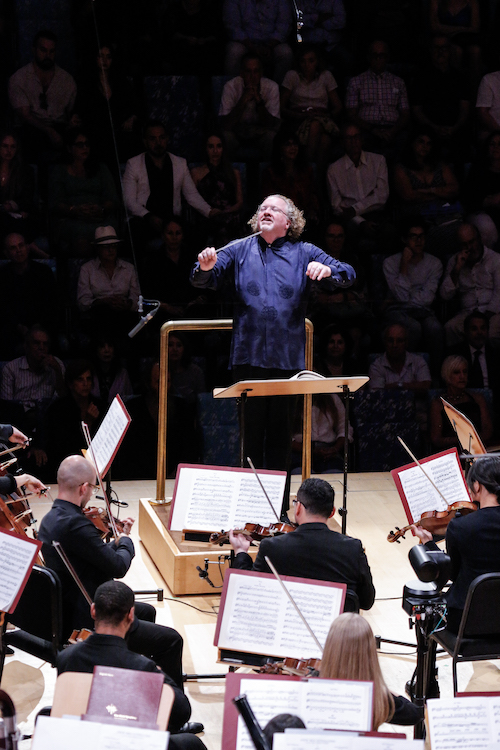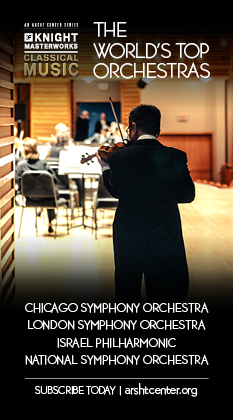Denève opens his first New World Symphony season with a rousing and lustrous ode to the sea

Stéphane Denève opened the New World Symphony’s season Saturday night in Miami Beach. Photo: Rui Dias-Aidos.
The next chapter in the thirty-five year history of the New World Symphony commenced on Saturday night as Stéphane Denève took the New World Center stage to open his first full season as the orchestral academy’s artistic director. The French conductor is a superb orchestral colorist and, as in previous appearances, he consistently draws the very best from his players.
Denève began the evening by recognizing the 37 new fellows in the ensemble, asking them to stand for the audience to welcome these freshman members with applause. He then introduced Molly Turner, the ensemble’s new conducting fellow and the first woman in that role in the orchestra’s history.
She led An American Port of Call by Adolphus Hailstork, the program’s opener. Hailstork’s overture is a portrait of the bustling seaport of Norfolk, Virginia, home to a naval base, international ports and cruise terminal.
In many ways, the work is comparable to Gershwin’s Cuban Overture in its lively invention, atmospheric thrust and melodic twists, except Hailstork is a resident rather than a musical tourist. Bluesy clarinet slides and the driving energy of Candide-era Bernstein prove consistently engaging throughout the nine-minute opus. Turner conducted with infectious zest and enthusiasm and drew a large sonic palette from the instrumental forces which included three trumpets, three trombones, tuba, three percussionists and keyboard.
The entire program revolved around the sea and the color blue (representing Miami Beach’s seas and skies and the color of the seats in the hall). Jacques Ibert’s Escales (Ports of Call) was once a staple of the symphonic repertoire but has fallen off the radar in recent decades which made Denève’s revival doubly welcome.
Ibert’s three tonal paintings of Rome and Palermo, Tunis and Valencia abound in thematic inspiration and gleaming timbres. In the initial Italian section, Denève’s finely varied dynamics and textural clarity brought out the evocative glints of wind and string hues. Few conductors can draw the richness and luster Denève evokes from the strings. A gorgeous oboe solo captured the Middle Eastern flavor of the Tunis movement. Clicking castanets and incisive string attacks set the mood for the briskly paced, Spanish-themed finale.
Britten and Debussy were well matched in the concert’s second half. The Four Sea Interludes from Britten’s opera Peter Grimes are influenced by impressionism despite the composer’s British musical accent. Conductor and orchestra made that potently clear in a riveting illumination that was rich in details often obscured in less scrupulous readings.
Violins and the wind section illuminated the mystery of “Dawn.” Distant church bells chimed against the rhythmically mercurial strains of “Sunday Morning,” captured with precision. The dreamy sheen of strings portrayed “Moonlight” over the water. Five French horns were beautifully integrated into the luminous aural fabric. Turbulent eruptions from the full orchestra gave harsh force to the climactic “Storm.”
Debussy’s La Mer is the ultimate sea portrait and Denève’s lucid reading radiated cinematic scope without sonic excess. The opening rumble of basses and harps resounded with immediacy. All sections of the ensemble were playing at fever pitch with the final climactic pages of “From Dawn to Noon on the Sea” powerfully rendered.
Brisk tempos kept the aura light and bright for “Play of the Waves.” The emphatic opening bars of “Dialogue of the Wind and the Sea” enunciated a change of mood with energy and well delineated inner voicings. Denève maintained tension and pulse through the final chords, concluding an exciting opening night concert.
The shadowy projections of clouds and skies by Clyde Scott and mood-setting lighting designs by Cory Sprinkles proved unobtrusive. Indeed, the final movement could have benefited from more vibrant visuals. Still, this initial concert bodes well for the season ahead and the future of the New World Symphony in the Stéphane Denève era.
Andrew Grams conducts the New World Symphony in Olly Wilson’s Shango Memory, Schoenberg’s orchestration of Brahms’ Piano Quartet No. 1 and Beethoven’s Piano Concerto No. 5 (“Emperor”) with Leif Ove Andsnes 7:30 p.m. September 30 at New World Center in Miami Beach. nws.edu
Posted in Performances
Leave a Comment
Sun Sep 17, 2023
at 1:11 pm
No Comments



